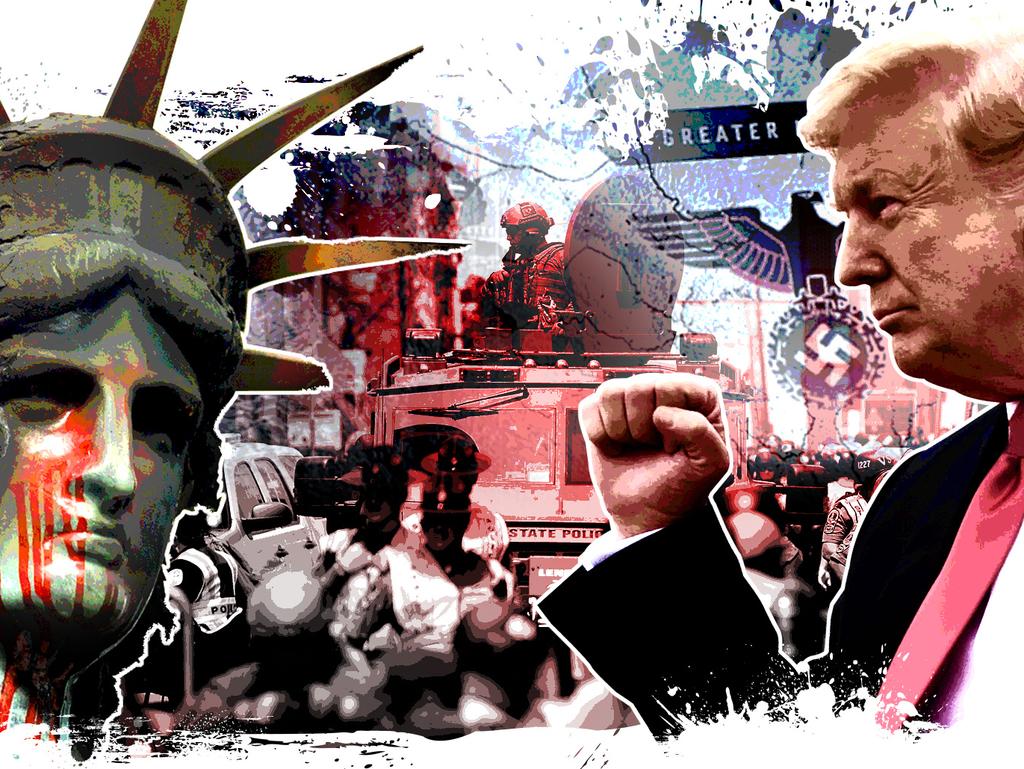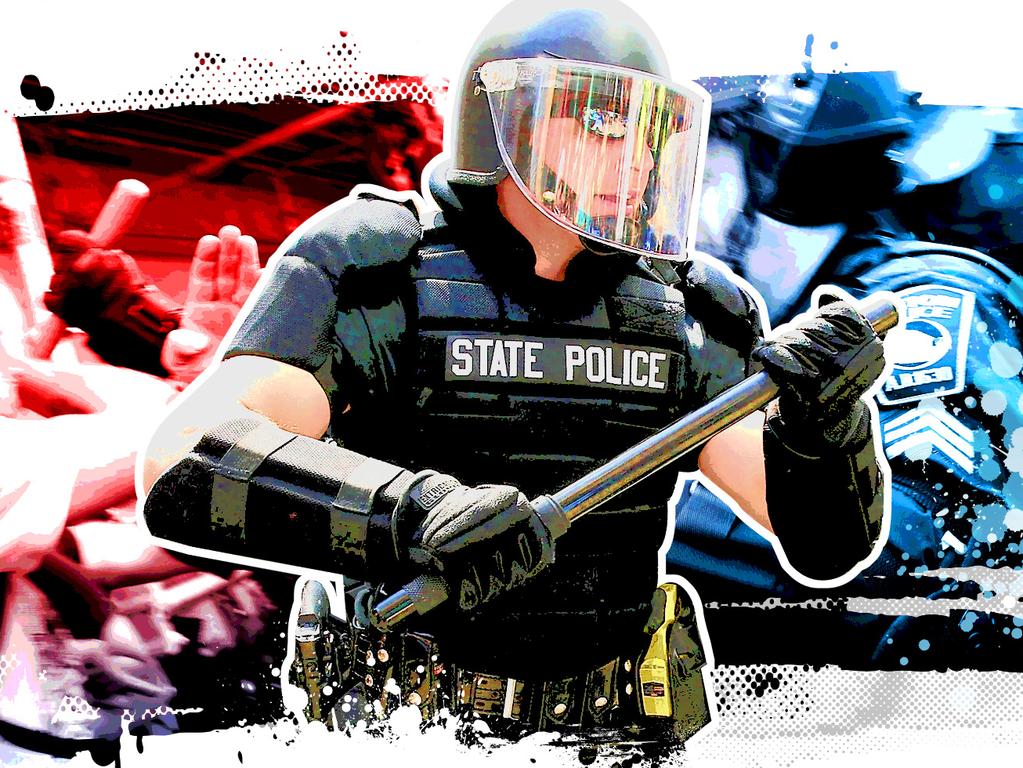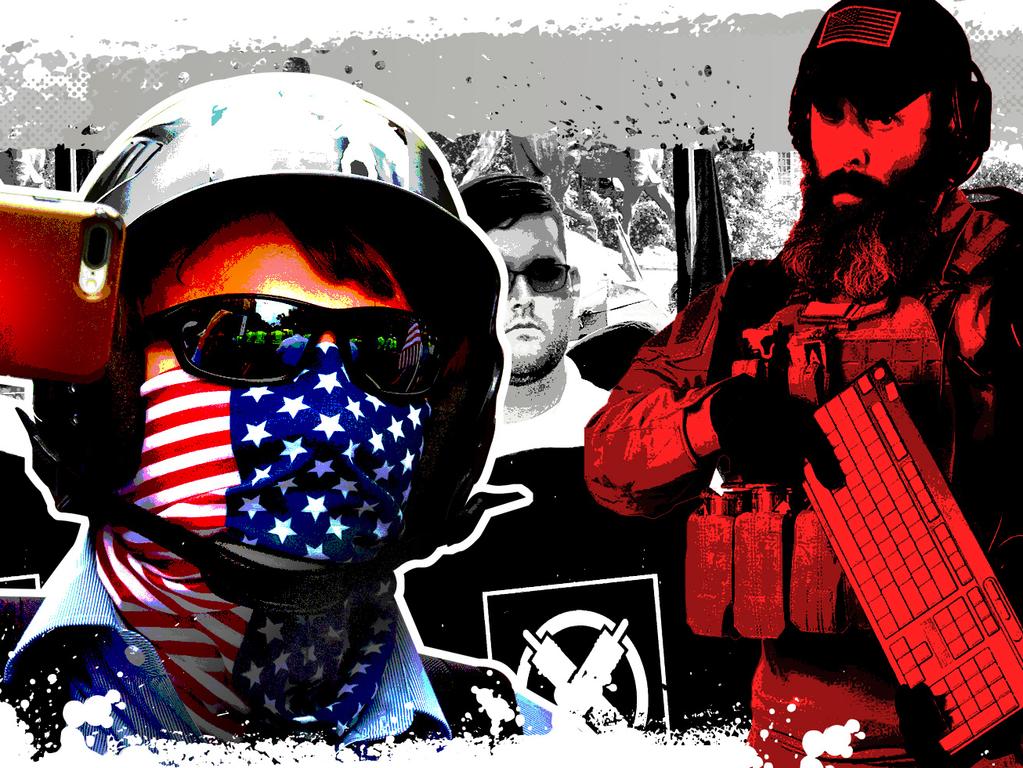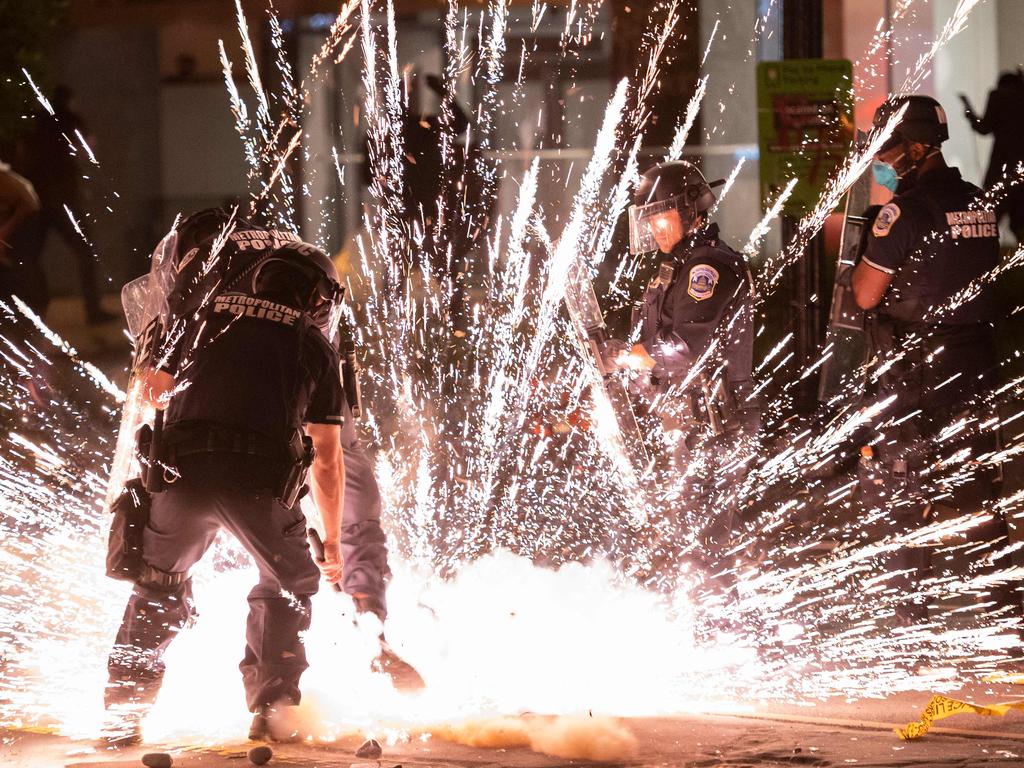US Protests: Donald Trump accused of leading US to civil war
As the COVID death toll soars past 100,000 and violent protests rage across the US, Trump is at a crossroads – and what happens next is crucial.
The spark was the death of an unarmed, passive black man in police custody.
The cause was a rising undercurrent of racial discrimination, a militarised police force, and a rapidly changing national demographic.
The context is one of a desperate, controversial president facing imminent elections.
The outcome? Analysts are starting to fear this all may lead to civil war, or worse.
And, if necessary, the 10th Mountain, 82nd Airborne, 1st Cav, 3rd Infantry—whatever it takes to restore order. No quarter for insurrectionists, anarchists, rioters, and looters. https://t.co/OnNJmnDrYM
— Tom Cotton (@TomCottonAR) June 1, 2020
COVID-19 has put the United States under stress. More than 100,000 have died, and the toll continues to rise. More than 40 million are unemployed.
How the fallout from these crises plays out in the November Presidential election is anybody’s guess.
If the Union makes it that far.
President Donald Trump has seized an opportunity.
RELATED: Another general turns on Trump
RELATED: American shocked by brutal video

Facing potential electoral defeat in elections scheduled for just five months, he’s motivating his electoral base. He’s going all-out to project an air of power and authority.
He’s calling demonstrators “THUGS” and “vicious dogs”. He’s invoked the Second Amendment right to bear arms: “When the looting starts, the shooting starts”. He’s boasted of his “unlimited” military power.
It’s a dangerous game.
Particularly the undertones of race.
Crossing State lines to incite violence is a FEDERAL CRIME! Liberal Governors and Mayors must get MUCH tougher or the Federal Government will step in and do what has to be done, and that includes using the unlimited power of our Military and many arrests. Thank you!
— Donald J. Trump (@realDonaldTrump) May 30, 2020
Washington, DC Mayor Muriel Bowser declared Trump’s reference to attack dogs was “no subtle reminder to African-Americans of segregationists that let dogs out on women, children and innocent people in the South”. She called Trump’s words “an attack on humanity.”
Trump’s followers deny this.
Race war can be bloody.
Just 159 years ago, 750,000 Americans were killed in the Civil War. This was a fight over whether or not enslaving African-Americans was constitutional or not.
The Union won.
But the ragged remains of the Confederacy was not convinced.
Its flag remains a cultural icon. Its racist philosophy remains deeply entrenched in politics, law enforcement, culture and religion.
It remains a stark division within US society.

And an alternative source of power.
The Rubicon, Crossed? https://t.co/1Vibv4SJAm
— David Armitage (@DavidRArmitage) June 3, 2020
AN AMERICAN CAESAR?
The parallel is hackneyed. But it remains relevant.
In January, 49BC, Julius Caesar ignited a civil war. He faced irrelevance. He had held all of Rome’s top jobs. Now his term as governor of Gaul was over. So, he ordered his army to cross the Rubicon River and seize control of Rome.
This act precipitated the collapse of the Roman Republic.
Caesar turned the quasi-democratic Senatorial and elected official system into a rubber stamp. Anyone who spoke against him was purged, exiled or killed.
Caesar gave himself the title of “dictator” – a role that back then activated a six-month “state of emergency” under which his word became law.
He used it to become king in all but name.
—-> pic.twitter.com/lseMGUYzux
— Zolan Kanno-Youngs (@KannoYoungs) June 2, 2020
The United States is a Republic. President Trump dominates the US Senate – as the recent impeachment trial proved. Supposedly independent institutions have experienced a revolving door of senior officials.
“The Republican senators’ speedy exoneration of Trump marks perhaps the most dramatic step in their capitulation to the president over the past three years,” says Timothy Joseph, associate professor of Classics at the College of the Holy Cross in Massachusetts.
“That process … recalls the ancient Roman senate’s compliance with the autocratic rule of the emperors and its transformation into a body largely reliant on the emperors’ whims.”
Joseph points out that Caesar convinced Rome that there was no separation between leader and state. Therefore, anything he did could not be illegal as it – by definition – was for the benefit of the state …
Caesar wasn’t above the law. He was the law. And he had massive popular – and violent – support among Rome’s disgruntled and disenfranchised.
— The White House (@WhiteHouse) June 2, 2020
It’s a mindset that clears a path for authoritarianism, Joseph says: “A central part of (President Trump’s) impeachment defence is, as we have seen, that the personal will of the president is indistinguishable from the will of the state and the good of the people.”
Trump can’t be accused of being inclusive.
Since being elected in 2016, he has asserted at least 30 times that he has an “absolute right” to wield executive authority.
He’s certainly been keen to impose his will on national institutions as diverse as the State Department and Department of Justice.
Now, he’s threatening to stamp on state governors – and put the US on the edge of a precipice.
“The case of the Roman Republic’s rapid slippage into an autocratic regime masquerading as a republic shows how easily that transformation can occur,” Joseph wrote.

OPPORTUNITY IN CRISIS
The United States is at crossroads: Will Trump unleash federal troops against his own people? Will he sideline state governors? Is this his Rubicon moment?
Posing with a bible held high as police fired teargas on demonstrators outside the White House, President Trump this week threatened to seize back control of city streets.
He labelled protesters domestic terrorists. He lambasted state governors for not “dominating” the rioters. He threatened to send in the federal military to “quickly solve the problem for them”.
Trump was standing in St John’s Episcopal Church in the state Capitol. It had been damaged the night before, as the President sheltered nearby in the bunker of a darkened White House.
It’s known as the “Church of the Presidents”. He rarely visits.
Around him, dozens of US cities – from Minneapolis to Atlanta, from New York to Grand Rapids – are seething with peaceful – and violent – protests.
The embattled president wants to fix it.
My fellow Americans - My first and highest duty as President is to defend our great Country and the American People. I swore an oath to uphold the laws of our Nation -- and that is exactly what I will do… pic.twitter.com/pvFxxi9BTR
— Donald J. Trump (@realDonaldTrump) June 2, 2020
“You’ve got to arrest people, you have to track people, you have to put them in jail for 10 years, and you’ll never see this stuff again,” Trump declared.
More than 5600 people have already been arrested nationwide over the past week. Offences as stealing, blocking highways and breaking curfew.
“We have the greatest country in the world,” the President declared. “We’re going to keep it safe.”
Trump says he’s willing to deploy his federal army to enforce this: “As we speak I am dispatching thousands and thousands of heavily armed soldiers … We are putting everybody on warning.”
His Defence Secretary Marc Esper was equally eager to “dominate the battlespace”.
That “battlespace” is the United States of America. “I think the sooner that you mass and dominate the battlespace, the quicker this dissipates and we can get back to the right normal,” he said.
The problem is: sending federal troops into unwilling states invokes a deadly precedent. Civil war.
Such fears produced in the Posse Comitatus Act, under which federal troops are prohibited from performing domestic law enforcement actions.
But there is an out.
Past presidents have invoked the 1807 Insurrection Act which gives them the power to deploy federal troops for law enforcement. They did so amid the racial flare-ups of the 1950s, 1960s and 1990s.
Problem is, constitutional lawyers say it’s supposed to be a power of US Congress. Not the president.

IN UNION, STRENGTH
Former US Marine General, and former US Secretary of Defence, James Mattis launched an extraordinary attack on the integrity of his former boss.
He says he did so only after reaching the conclusion that the United States faced a clear and present danger in the actions of its president.
“We must reject and hold accountable those in office who would make a mockery of our Constitution,” he declared in a scathing public document. “Donald Trump is the first president in my lifetime who does not try to unite the American people — does not even pretend to try. Instead, he tries to divide us.”
Mattis was soon joined by other – this time serving – leaders of the US Military.
US Air Force National Guard General Joseph Lengyel issued a statement to his troops:
We must do better. pic.twitter.com/AOL2sfKwfP
— General Joseph Lengyel (@ChiefNGB) June 4, 2020
“Everyone who wears the uniform of our country takes an oath to uphold the Constitution and everything for which it stands,” he wrote. “If we are to fulfil our obligation as service members, as Americans, and as decent human beings, we have to take our oath seriously”.
Even Trump’s serving Chairman of the Joint Chiefs of Staff, General Mark Milley, reminded serving personnel to put their oath above their politics: “We all committed our lives to the idea that is America — We will stay true to that oath and the American people.”
Chairman of the Joint Chiefs of Staff #GenMilley:
— The Joint Staff 🇺🇸 (@thejointstaff) June 3, 2020
"We all committed our lives to the idea that is America--We will stay true to that oath and the American people."
Read the Chairman's full message to the Joint Force: https://t.co/4repOZWTqP@DeptofDefense pic.twitter.com/h4RdrThWnK
Mattis highlighted the clash of ideologies behind World War II.
“The Nazi slogan for destroying us … was ‘Divide and Conquer’. Our American answer (was) ‘In Union there is Strength’. We must summon that unity to surmount this crisis — confident that we are better than our politics.”
Mattis attacked the militant terminology being directed at US citizens by its government.
“We must reject any thinking of our cities as a ‘battlespace’ that our uniformed military is called upon to ‘dominate’ … It erodes the moral ground that ensures a trusted bond between men and women in uniform and the society they are sworn to protect, and of which they themselves are a part.”
Meanwhile, Trump continues to push a militaristic line: “The problem is not the very talented, low-flying helicopter pilots wanting to save our city, the problem is the arsonists, looters, criminals, and anarchists, wanting to destroy it (and our Country)!”
The problem is not the very talented, low-flying helicopter pilots wanting to save our city, the problem is the arsonists, looters, criminals, and anarchists, wanting to destroy it (and our Country)!
— Donald J. Trump (@realDonaldTrump) June 4, 2020
STATE OF THE UNION
“The Minneapolis protests are showing how an already precarious social fabric has been frayed by the COVID-19 lockdowns,” writes University of Melbourne associate professor in American Politics Timothy Lynch.
“Americans have not come together to fight the virus. Rather, they have allowed a public health disaster to deepen divisions along racial, economic, sectional and ideological lines.”
Not every senior Republican is backing Trump’s behaviour.
Senator Tim Scott of Carolina – the only black Republican in the US Senate – dared call the President’s Tweets “not constructive”. The Republican governor of Maryland, Larry Hogan, said Trump was “continuing to escalate the temperature”, and this was the “opposite” of what was needed.
Such Republican voices of dissent are few and far between.
Dear Progressive Mayors,
— Rudy W. Giuliani (@RudyGiuliani) June 2, 2020
A novel suggestion; you might consider using your police to prevent looting, arson and assault, not just to observe it.
Don’t worry the looters, arsonists, released convicts and Antifa will vote Democrat no matter what. They know what’s best for them.
And Trump just keeps challenging the institutions that are the foundation stone of US democracy: Institutional independence. Media cross-examination. State’s rights.
In March, he launched an attack against Washington Governor Jay Inslee. At stake was the national COVID-19 response. Trump’s reaction: “I don’t like you, so you know who’s going to suffer? Your whole state. Same with the woman from Michigan. She calls, and we don’t call her back.”
Minneapolis presents another opportunity.
Never let a good crisis go to waste: It’s a political catchcry the world over.
It’s a solid Democrat state. It has a Democrat governor.
Mayor Jacob Frey of Minneapolis will never be mistaken for the late, great General Douglas McArthur or great fighter General George Patton. How come all of these places that defend so poorly are run by Liberal Democrats? Get tough and fight (and arrest the bad ones). STRENGTH!
— Donald J. Trump (@realDonaldTrump) May 30, 2020
“Trump will claim that decades of Democratic policies in Minnesota – including the eight years of the Obama administration – have caused Minneapolis to be one of the most racially unequal cities in the nation,” Lynch says.
This crisis is an opportunity for wedge politics – on a national scale.
Trump is now threatening to send in his “Feds” to “dominate the streets” if governors – particularly Democrats – don’t do so themselves.
But US governors have individual state-based National Guard units as emergency response forces for a reason: Sending in the federal army has Civil War connotations.

A RUBICON MOMENT?
President Trump has the power to declare a national emergency.
It’s a call entirely at his personal discretion.
It’s a call that sets aside many of the legal limitations to his authority.
It’s a call that activates more than 100 special provisions enabling him to do anything from disabling communication networks to freezing bank accounts, deploying troops to suspending laws.
Such powers are supposed to be a temporary boost to a federal government’s ability to respond to a crisis.
“We’re not being our best selves. We’re not living up to the American dream,” says former US Ambassador to Australia Jeffrey Bleich.
“People don’t know what to believe, and they don’t have a clear sense of the direction of the government and what’s what, what may happen next. And so that just leads to a lot of speculation, and a lot of discussions of worst case scenarios. I don’t think we’re on the verge of a civil war. On the other hand, I think there is a fear of the unknown.”
NEWS: A Twitter account claiming to belong to a national “antifa†organization and pushing violent rhetoric related to ongoing protests has been linked to the white nationalist group Identity Evropa, according to a Twitter spokesperson. https://t.co/tvqApOJ2pV
— Sahil Kapur (@sahilkapur) June 2, 2020
Meanwhile, Trump is mobilising his supporter base, suggesting they assemble to protect him at the White House. “I heard that MAGA wanted to be there — that a lot of MAGA was going to be there,” Trump said, using his political campaign acronym for “Make America Great Again”.
He’s blaming a sweepingly-defined “enemy”.
“Trump, a ferocious campaigner, will try to find ways to use both tragedies to his advantage and, importantly, makes things worse for his challenger,” Lynch writes.
The Democrat Party is in no strong position.
But Trump is busy deepening the trench between the left and right of politics.
He’s blaming “antifa” – and by association the left- for all the nation’s woes.
But antifa doesn’t exist. It’s a catchcry that merges “anti-fascist” into a phrase thrown about by far-left activists. It’s a label that has proven to inspire and motivate their far-right opponents.
“Trump has, of course, often sought to gain from divisions,” Lynch notes. “But the magnitude and severity of the twin crises he is now facing will make this very difficult. By numerous measures, his is a presidency in crisis.”
The professionally managed so-called “protesters†at the White House had little to do with the memory of George Floyd. They were just there to cause trouble. The @SecretService handled them easily. Tonight, I understand, is MAGA NIGHT AT THE WHITE HOUSE???
— Donald J. Trump (@realDonaldTrump) May 30, 2020
The US has suddenly been thrust into turmoil. The great nation has been brought low.
Meanwhile, President Trump appears to be standing on the banks of a Rubicon river. And his conviction that he has the “absolute right” to executive power has been well established.
What comes next?
Lynch remains optimistic.
“The US has faced serious challenges before – and emerged stronger. Neither the civil war in the 19th century or the Spanish flu pandemic in the early 20th halted the extraordinary growth in power that followed both,” he says.
“Moreover, the US constitution remains intact and federalism has undergone something of a rebirth since the start of the pandemic. And there is a new generation of younger, more diverse, national leaders being forged in the fire of crisis to help lead the recovery.”
Your Lincoln Memorial this evening. pic.twitter.com/QByGgWeDDm
— Martha Raddatz (@MarthaRaddatz) June 3, 2020
Jamie Seidel is a freelance writer | @JamieSeidel




